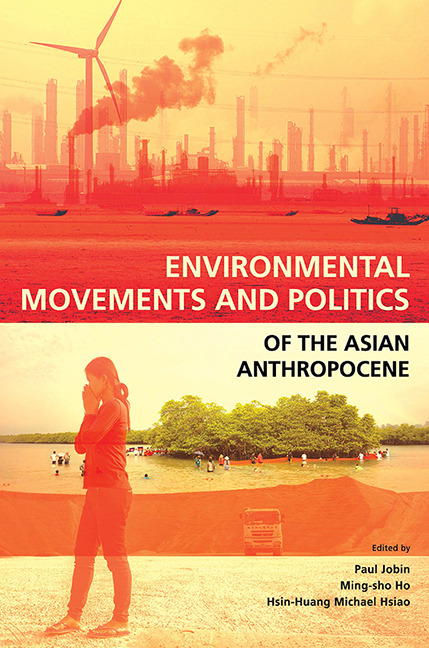Book contents
- Frontmatter
- Contents
- List of Tables, Maps and Figures
- Acknowledgements
- About the Contributors
- 1 Environmental Movements and Politics of the Asian Anthropocene: An Introduction
- 2 Environmental Movements in Taiwan’s Anthropocene: A Civic Eco-Nationalism
- 3 Environmental Movements in Post-handover Hong Kong: Between Managerialism and Radicalism
- 4 The Post-politics of Environmental Engagement in Singapore
- 5 Environmental Movements in the Philippines: Contestation for Justice in the Anthropocene
- 6 Environmental NGOs in “Post-New Order” Indonesia: Saving the Forests Through Democracy
- 7 Environmental Activism in Malaysia: Struggling for Justice from Indigenous Lands to Parliamentary Seats
- 8 State, NGOs, and Villagers: How the Thai Environmental Movement Fell Silent
- 9 Environmental Movements in Vietnam under One-Party Rule
- 10 The Cambodian Neopatrimonial State, Chinese Investments, and Anti-dam Movements
- 11 Conclusion: Environmental Movements and Political Regimes, or Why Democracy Still Matters in the Anthropocene
- Index
11 - Conclusion: Environmental Movements and Political Regimes, or Why Democracy Still Matters in the Anthropocene
Published online by Cambridge University Press: 08 October 2021
- Frontmatter
- Contents
- List of Tables, Maps and Figures
- Acknowledgements
- About the Contributors
- 1 Environmental Movements and Politics of the Asian Anthropocene: An Introduction
- 2 Environmental Movements in Taiwan’s Anthropocene: A Civic Eco-Nationalism
- 3 Environmental Movements in Post-handover Hong Kong: Between Managerialism and Radicalism
- 4 The Post-politics of Environmental Engagement in Singapore
- 5 Environmental Movements in the Philippines: Contestation for Justice in the Anthropocene
- 6 Environmental NGOs in “Post-New Order” Indonesia: Saving the Forests Through Democracy
- 7 Environmental Activism in Malaysia: Struggling for Justice from Indigenous Lands to Parliamentary Seats
- 8 State, NGOs, and Villagers: How the Thai Environmental Movement Fell Silent
- 9 Environmental Movements in Vietnam under One-Party Rule
- 10 The Cambodian Neopatrimonial State, Chinese Investments, and Anti-dam Movements
- 11 Conclusion: Environmental Movements and Political Regimes, or Why Democracy Still Matters in the Anthropocene
- Index
Summary
In the introduction, we adopted the notion of the Anthropocene as a symbol of the planetary scale of the environmental crisis, and a time marker for the last two decades (see Chapter 1). Given Southeast Asia's rich biodiversity and its pivotal role in global capitalism—with hubs like Taiwan, Hong Kong, and Singapore—the countries we chose to focus on in this book bear an important responsibility in the Anthropocene in general, and its Asian version in particular. But they are interesting for other reasons, which lie in the dialectics between civil society and political regimes, and the contribution of their environmental movements in a geopolitical context marked by China's growing hegemony.
In the previous chapters, we have seen a great variety in the repertoire of collective action, with different levels of engagement and risk. For example, in the case of the Philippines (Chapter 5), while online petitions on climate change policy may present no risk for those who click to sign, court litigation and protest marches against coal plants require greater commitment and do not exclude perils such as police brutality, and disruptive actions against illegal logging and agribusiness thugs entail considerable danger such as “extra-judicial killings”. Cambodian environmental activists are likewise exposed to the risk of murder. Such dramatic endings are thus far unheard of in Taiwan, Singapore, or Vietnam, although in Vietnam activists might be condemned to long prison sentences on false pretexts. These examples suggest that opportunity structures for environmental activism vary greatly depending on patterns of political regime. One goal of our book has been to examine the evolution of this interaction between environmental movements and political regimes in our selection of East and Southeast Asian countries over the first two decades of the twenty-first century.
In the collective opus published twenty years ago—and which inspired the present book—Lee et al. (1999, chapter 9) evaluated the impact of democratization on environmental movements in East Asia. In the cases of South Korea, Taiwan, and the Philippines, the authors found that environmental movements played a significant role in the process of political liberalization, democratization, and democratic consolidation. They called these environmental movements partners or guardians of the democracy movement (i.e., partners in the democratization process while it was still in the making, and guardians once significant steps towards democratization had been achieved).
- Type
- Chapter
- Information
- Environmental Movements and Politics of the Asian Anthropocene , pp. 329 - 358Publisher: ISEAS–Yusof Ishak InstitutePrint publication year: 2021

